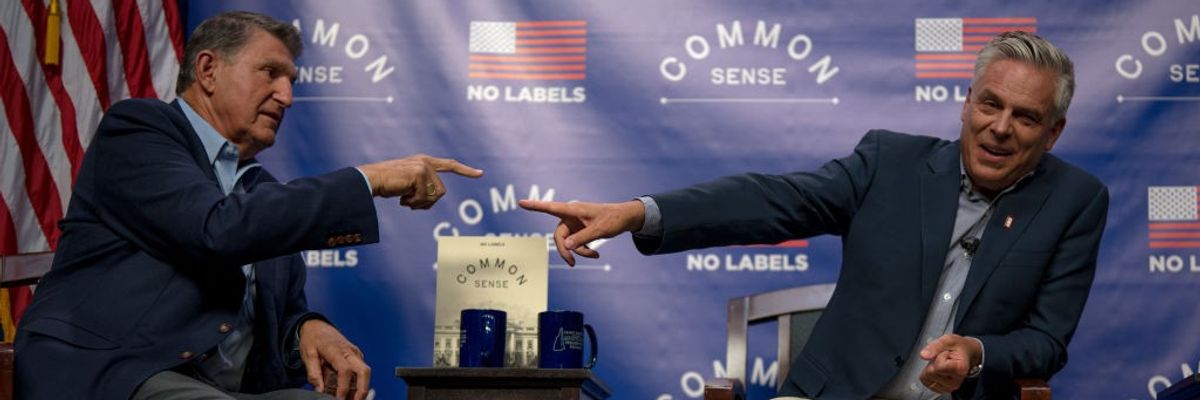Less than a month after No Labels announced it would nominate a "unity ticket" for the 2024 presidential election, the group said Thursday that it is abandoning its longshot third-party White House bid.
"No Labels has always said we would only offer our ballot line to a ticket if we could identify candidates with a credible path to winning the White House," the group said in a statement. "No such candidates emerged, so the responsible course of action is for us to stand down."
As Common Dreams reported last month, No Labels—whose own leader has admitted is "not in it to win it" but rather to "give people a choice"—has poured millions of dollars in dark money contributions into a quixotic run that critics like MoveOn executive director Rahna Epting warned could "swing the election to Donald Trump," the twice-impeached former Republican president and presumptive GOP nominee, 91 federal and state criminal charges notwithstanding.
No Labels had floated former Republican Maryland Gov. Larry Hogan and former South Carolina Gov. Nikki Haley, a failed 2024 GOP presidential contender, as possible "unity ticket" candidates. However, the group ultimately found no takers.
Top No Labels donors include billionaire and multimillionaire Trump supporters like Nelson Peltz, private equity executive Stephen Schwarzman of Blackstone, and former 20th Century Fox CEO James Murdoch. Louis Bacon, the billionaire CEO of hedge fund Moore Capital Management, donated $1 million each to No Labels and the Republican Party after giving the maximum allowable contribution to Sen. Kyrsten Sinema, formerly one of the conservative Democrats in Congress and now an Independent.
Even with all that financial backing, No Labels' path to the ballot has been dubious. MoveOn has urged states to investigate the group for allegedly misleading voters through deceptive canvassing methods that result in their disenfranchisement.
The U.S. two-party system has been criticized for monopolizing political power at the expense of democracy and voter choice by actively working to thwart all viable third-party and independent candidates. However, political pragmatists note what they say is the folly of running unwinnable races.
"Third-party candidates are the fools gold of this election," MoveOn said on social media, adding that neither No Labels nor conspiracy theorist Robert F. Kennedy "have ballot access in all 50 states and mathematically cannot win."
"They can only play spoiler," the group added.
However, while Democrats and Republicans often automatically gain ballot access, the two parties are largely behind state laws that create often insurmountable barriers for third-party and independent challengers.
Other progressives also welcomed the news of No Labels' withdrawal—but with a warning. Melanie D'Arrigo, executive director of the Campaign for New York Health, quipped on social media that No Labels was quitting "to spend more time with their lobbyists."
"Billionaires pump millions into No Labels, and in return, their politicians push policies that transfer wealth from the working-class back to billionaires," she added. "Just because they aren't running a presidential candidate doesn't mean they aren't still a serious threat to democracy."
